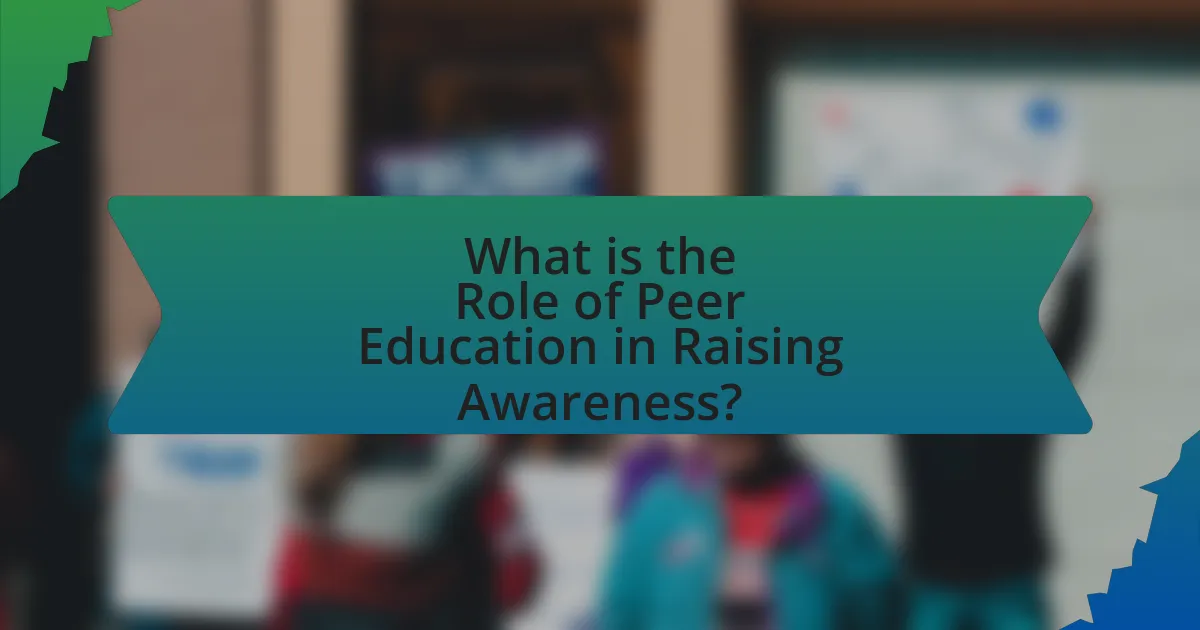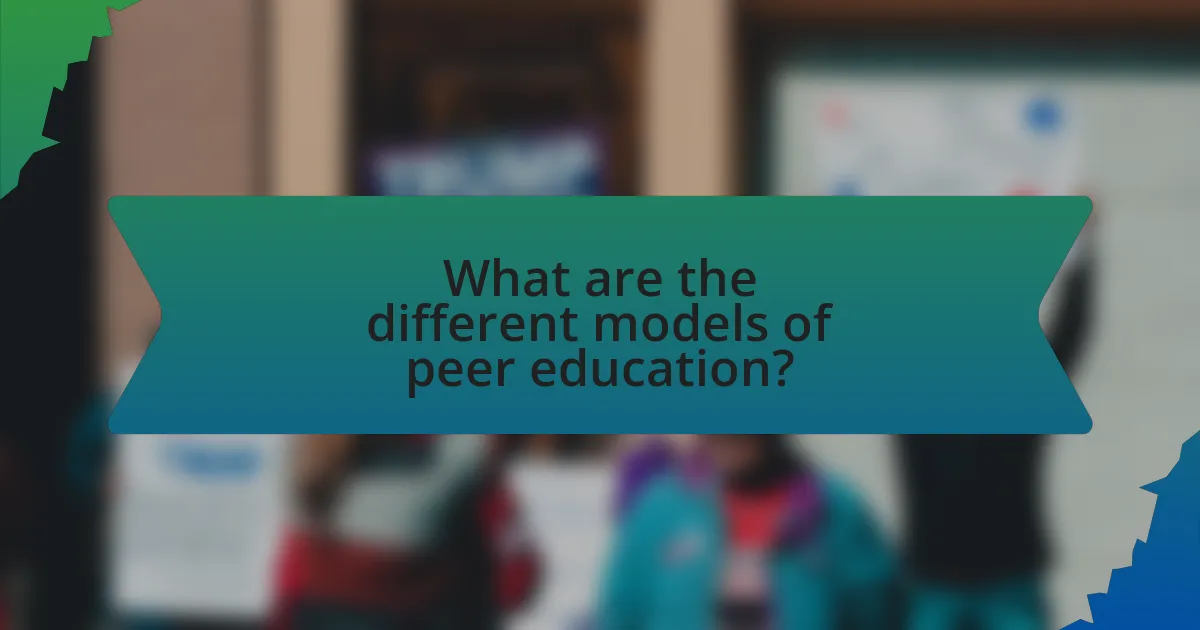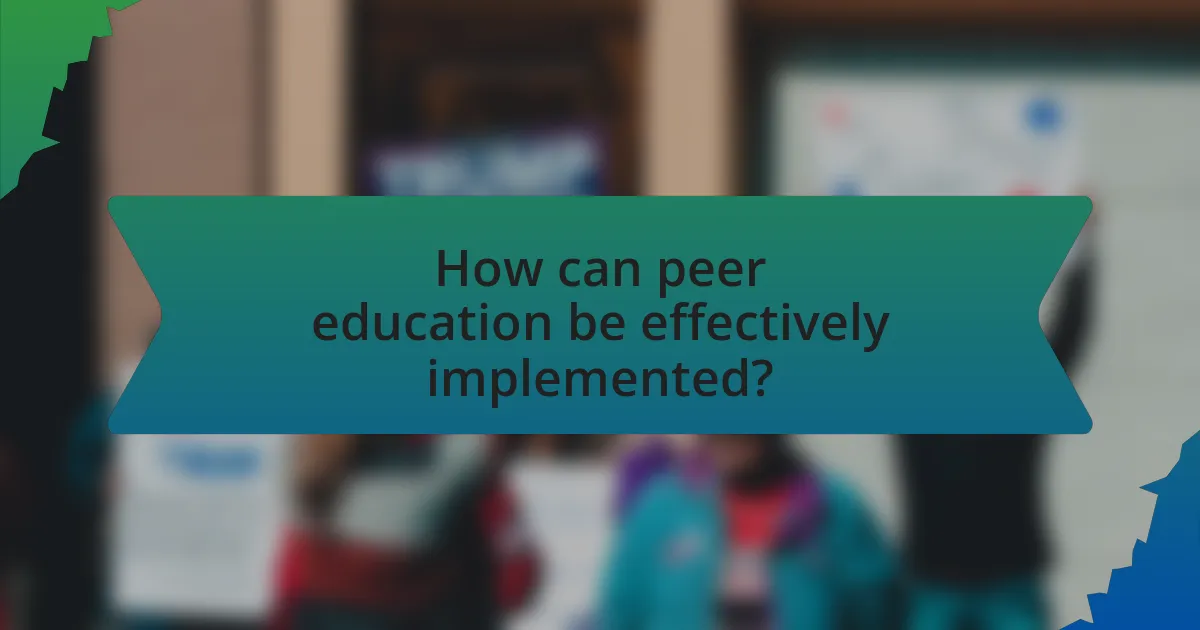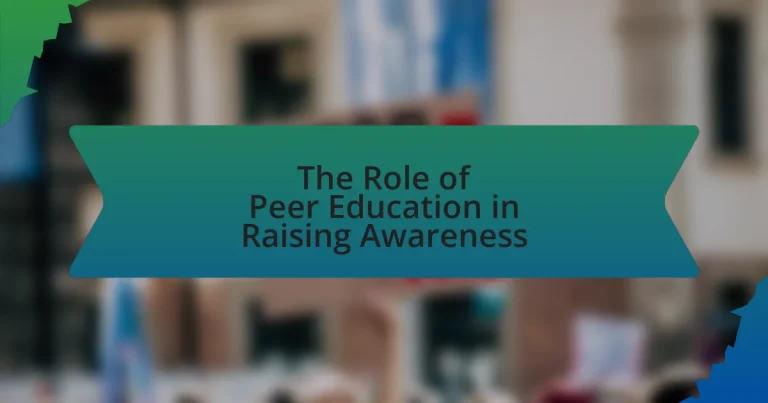Peer education is a vital approach in raising awareness by facilitating knowledge transfer among individuals of similar age or social status. This article explores the effectiveness of peer education in awareness campaigns, highlighting its principles such as mutual respect, shared responsibility, and empowerment. It examines how peer educators influence their peers, the unique advantages of this method over traditional education, and the various models of peer education. Additionally, the article addresses the challenges faced by peer education initiatives, the importance of training, and strategies for effective implementation. Emerging trends, including the integration of technology and focus on mental health, are also discussed, showcasing the evolving landscape of peer education in promoting awareness.

What is the Role of Peer Education in Raising Awareness?
Peer education plays a crucial role in raising awareness by facilitating knowledge transfer among individuals of similar age or social status. This method leverages the influence peers have on each other, making information more relatable and accessible. Research indicates that peer-led initiatives can significantly improve understanding and retention of health-related topics, as evidenced by a study published in the Journal of Adolescent Health, which found that peer education programs increased awareness of sexual health issues among adolescents by 30%. By fostering open communication and trust, peer education effectively engages communities, leading to enhanced awareness and behavioral change.
How does peer education function in awareness campaigns?
Peer education functions in awareness campaigns by leveraging the influence and relatability of peers to disseminate information and promote behavioral change. This approach fosters trust and engagement, as individuals are more likely to accept messages from those they perceive as similar or credible. Research indicates that peer-led initiatives can significantly enhance knowledge retention and encourage positive health behaviors, as evidenced by a study published in the Journal of Adolescent Health, which found that peer education programs increased awareness of sexual health issues among adolescents by 30%.
What are the key principles of peer education?
The key principles of peer education include mutual respect, shared responsibility, and empowerment. Mutual respect ensures that peer educators value each other’s experiences and perspectives, fostering a supportive environment. Shared responsibility emphasizes that both educators and learners are active participants in the learning process, promoting collaboration. Empowerment focuses on equipping individuals with knowledge and skills to make informed decisions, enhancing their confidence and agency. These principles are supported by research indicating that peer-led initiatives can effectively influence behavior change and increase knowledge retention among participants.
How do peer educators influence their peers?
Peer educators influence their peers by providing relatable information and support, which enhances understanding and encourages positive behavior change. They leverage their shared experiences and social connections to create a comfortable environment for discussion, making it easier for peers to engage with topics such as health, education, and social issues. Research indicates that peer-led interventions can significantly improve knowledge retention and behavioral intentions; for instance, a study published in the Journal of Adolescent Health found that peer education programs increased awareness of sexual health issues among adolescents by 30%. This effectiveness stems from the trust and credibility that peer educators establish, which fosters a sense of community and encourages open dialogue.
Why is peer education important for raising awareness?
Peer education is important for raising awareness because it leverages the influence of peers to effectively communicate information and foster understanding within specific communities. This approach is particularly effective as individuals often relate better to their peers than to authority figures, leading to increased engagement and receptiveness to the message. Research indicates that peer-led initiatives can enhance knowledge retention and behavioral change; for instance, a study published in the Journal of Adolescent Health found that peer education programs significantly improved awareness and attitudes towards sexual health among adolescents. Thus, the effectiveness of peer education in raising awareness is supported by its ability to create relatable and trusted communication channels.
What unique advantages does peer education offer over traditional methods?
Peer education offers unique advantages over traditional methods by fostering relatability and engagement among learners. This approach allows individuals to receive information from peers who share similar experiences and backgrounds, which enhances trust and receptiveness. Research indicates that peer-led initiatives can lead to higher retention rates of information, as evidenced by a study published in the Journal of Adolescent Health, which found that peer education programs increased knowledge retention by 20% compared to traditional lectures. Additionally, peer education encourages active participation and empowerment, as individuals feel more comfortable discussing sensitive topics with their peers, leading to more open dialogue and effective learning outcomes.
How does peer education foster community engagement?
Peer education fosters community engagement by empowering individuals to share knowledge and experiences within their social networks. This approach creates a sense of ownership and responsibility among peers, leading to increased participation in community initiatives. Research indicates that peer-led programs enhance trust and communication, as individuals are more likely to relate to and learn from their peers than from traditional educators. For example, a study published in the Journal of Community Health found that peer education significantly improved health-related behaviors and community involvement among participants, demonstrating its effectiveness in fostering engagement.

What are the different models of peer education?
The different models of peer education include the peer-led model, the peer-assisted model, and the peer mentoring model. The peer-led model involves individuals from similar backgrounds educating each other, fostering relatability and trust, which enhances engagement and learning outcomes. The peer-assisted model incorporates trained peers who support and guide their peers in specific areas, often in academic or health-related contexts, thereby facilitating knowledge transfer and skill development. The peer mentoring model pairs individuals for one-on-one support, focusing on personal development and goal achievement, which has been shown to improve self-efficacy and motivation among participants. Each model is effective in promoting awareness and behavior change, as evidenced by various studies demonstrating improved outcomes in health education and social skills development.
How do various peer education models operate?
Various peer education models operate by utilizing trained individuals from similar demographic backgrounds to deliver information and support to their peers. These models often emphasize experiential learning, where peer educators share personal experiences and knowledge to foster understanding and behavior change. For instance, in health education, peer educators may conduct workshops or discussions that address specific issues like sexual health or substance abuse, creating a relatable environment for participants. Research indicates that peer-led interventions can significantly improve knowledge retention and behavioral outcomes, as evidenced by a study published in the Journal of Adolescent Health, which found that peer education programs increased awareness and reduced risky behaviors among adolescents.
What are the characteristics of successful peer education programs?
Successful peer education programs are characterized by effective training, clear objectives, and strong support systems. Effective training equips peer educators with the necessary knowledge and skills to convey information accurately and engage their peers. Clear objectives ensure that the program has specific goals, such as increasing awareness about health issues or promoting safe behaviors. Strong support systems, including mentorship and resources, enhance the sustainability and impact of the program. Research indicates that programs with these characteristics, such as the “Peer Education Program” by the World Health Organization, demonstrate higher engagement and retention rates among participants, leading to more significant behavioral changes.
How do these models adapt to different contexts and audiences?
Models adapt to different contexts and audiences by utilizing tailored communication strategies that resonate with specific demographic characteristics and cultural backgrounds. For instance, peer education models often incorporate relatable language, culturally relevant examples, and interactive methods to engage participants effectively. Research indicates that when peer educators share personal experiences and utilize storytelling, they enhance relatability and trust, which increases the likelihood of message acceptance (Holt et al., 2018, “Peer Education: A Powerful Tool for Health Promotion,” Journal of Health Communication). This adaptability ensures that the educational content is not only accessible but also impactful across diverse groups.
What challenges do peer education initiatives face?
Peer education initiatives face several challenges, including lack of funding, insufficient training for peer educators, and difficulties in reaching target populations. Funding constraints often limit the scope and sustainability of these programs, making it hard to maintain consistent outreach efforts. Additionally, peer educators may not receive adequate training, which can hinder their effectiveness in delivering accurate information and support. Furthermore, engaging specific target groups, such as marginalized communities, can be challenging due to social stigma or logistical barriers, reducing the overall impact of the initiatives.
How can peer educators overcome common obstacles?
Peer educators can overcome common obstacles by utilizing effective communication strategies and fostering a supportive network. By actively engaging in training programs, peer educators enhance their skills to address challenges such as resistance from peers or lack of resources. Research indicates that peer-led initiatives, like those documented in the “Peer Education: A Strategy for Health Promotion” report by the World Health Organization, show that structured support systems significantly improve the effectiveness of peer education. This evidence highlights that when peer educators collaborate and share experiences, they can navigate obstacles more efficiently, leading to greater impact in raising awareness.
What role does training play in addressing these challenges?
Training plays a crucial role in addressing challenges related to peer education by equipping individuals with the necessary skills and knowledge to effectively communicate and educate their peers. This preparation enhances their ability to convey important information, engage in meaningful discussions, and foster a supportive environment for learning. Research indicates that well-structured training programs significantly improve the effectiveness of peer educators, leading to increased awareness and behavioral change among their peers. For instance, a study published in the Journal of Health Communication found that peer educators who underwent comprehensive training were 40% more effective in delivering health messages compared to those without training.

How can peer education be effectively implemented?
Peer education can be effectively implemented by training individuals from the target community to deliver educational content to their peers. This approach fosters relatability and trust, which enhances engagement and retention of information. Research indicates that peer-led interventions can lead to significant improvements in knowledge and behavior change; for instance, a study published in the Journal of Adolescent Health found that peer education programs increased knowledge about sexual health by 30% among participants. Additionally, establishing clear objectives, providing ongoing support and resources, and evaluating the program’s impact are essential components for successful implementation.
What strategies enhance the effectiveness of peer education?
Effective strategies that enhance the effectiveness of peer education include training peer educators thoroughly, fostering a supportive environment, and utilizing interactive teaching methods. Thorough training equips peer educators with the necessary knowledge and skills to convey information accurately and confidently, which has been shown to improve learning outcomes (Barker et al., 2016). A supportive environment encourages open communication and trust, allowing peers to share experiences and learn from one another, which enhances engagement and retention of information (Holt et al., 2018). Interactive teaching methods, such as role-playing and group discussions, promote active participation, making the learning experience more impactful and memorable (Topping, 2005). These strategies collectively contribute to the overall success of peer education initiatives.
How can organizations support peer educators in their roles?
Organizations can support peer educators by providing comprehensive training programs that enhance their skills and knowledge. Effective training equips peer educators with the necessary tools to communicate effectively and address the needs of their peers. Research indicates that well-trained peer educators are more successful in delivering accurate information and fostering engagement, as seen in studies conducted by the World Health Organization, which highlight the importance of training in improving educational outcomes. Additionally, organizations can offer ongoing mentorship and resources, ensuring that peer educators feel supported and confident in their roles. This approach not only boosts their effectiveness but also contributes to a sustainable peer education model.
What metrics can be used to evaluate the success of peer education programs?
Metrics used to evaluate the success of peer education programs include participant knowledge gain, behavior change, engagement levels, and program reach. Participant knowledge gain can be assessed through pre- and post-program surveys that measure understanding of the subject matter, demonstrating the educational impact of the program. Behavior change can be evaluated by tracking changes in attitudes or actions related to the program’s focus, such as increased safe practices in health-related programs. Engagement levels can be measured through attendance rates, participation in activities, and feedback from participants, indicating the program’s effectiveness in maintaining interest. Finally, program reach can be quantified by the number of individuals served and the diversity of the audience, reflecting the program’s ability to engage various community segments. These metrics collectively provide a comprehensive assessment of the program’s success in achieving its educational goals.
What best practices should be followed in peer education?
Effective peer education should prioritize creating a safe and inclusive environment for open dialogue. This practice fosters trust and encourages participants to share their experiences and concerns without fear of judgment. Additionally, peer educators should be well-trained in the subject matter and possess strong communication skills to convey information accurately and effectively. Research indicates that peer-led initiatives can enhance learning outcomes, as seen in a study published in the Journal of Adolescent Health, which found that peer education significantly improved knowledge and attitudes regarding sexual health among adolescents. Furthermore, incorporating interactive methods, such as role-playing and group discussions, can engage participants more deeply, leading to better retention of information.
How can peer education be tailored to specific demographics?
Peer education can be tailored to specific demographics by customizing the content, delivery methods, and peer educator selection to align with the cultural, social, and educational backgrounds of the target group. For instance, when addressing adolescents, programs can incorporate relatable language and scenarios that resonate with their experiences, as evidenced by studies showing that youth-led initiatives increase engagement and retention of information. Additionally, utilizing peer educators who share similar backgrounds or experiences with the demographic enhances trust and relatability, which has been supported by research indicating that peer influence is a significant factor in behavior change among young people.
What resources are available for developing peer education initiatives?
Resources available for developing peer education initiatives include training manuals, online platforms, and community partnerships. Training manuals, such as those provided by organizations like the World Health Organization, offer structured guidance on implementing peer education programs effectively. Online platforms, including social media and educational websites, facilitate the sharing of best practices and resources among peer educators. Community partnerships with local health organizations or educational institutions enhance the reach and impact of peer education initiatives by providing additional support and resources. These resources collectively contribute to the successful development and sustainability of peer education programs.
What are the future trends in peer education for raising awareness?
Future trends in peer education for raising awareness include the integration of digital platforms, increased focus on mental health, and the use of gamification techniques. Digital platforms, such as social media and mobile applications, facilitate broader outreach and engagement among peers, allowing for real-time sharing of information and resources. The emphasis on mental health reflects a growing recognition of its importance, leading to peer-led initiatives that promote mental well-being and reduce stigma. Gamification techniques, which incorporate game-like elements into educational activities, enhance participation and retention of information, making learning more engaging. These trends are supported by research indicating that digital engagement increases awareness and that peer-led mental health programs effectively reduce stigma and improve outcomes.
How is technology influencing peer education strategies?
Technology is significantly influencing peer education strategies by enhancing communication, accessibility, and engagement among peers. Digital platforms, such as social media and mobile applications, facilitate real-time information sharing and collaboration, allowing peer educators to reach a broader audience. For instance, a study published in the Journal of Medical Internet Research found that online peer support groups increased participation and engagement in health education initiatives by 30%. Additionally, technology enables the use of multimedia resources, such as videos and interactive content, which can improve understanding and retention of information among peers. This integration of technology into peer education not only fosters a more interactive learning environment but also empowers individuals to take an active role in their education and advocacy efforts.
What emerging topics are being addressed through peer education?
Emerging topics being addressed through peer education include mental health awareness, sexual health education, substance abuse prevention, and digital literacy. These topics are increasingly relevant as they reflect societal changes and the need for informed discussions among peers. For instance, a study published in the Journal of Adolescent Health highlights that peer-led initiatives in mental health can significantly reduce stigma and improve help-seeking behaviors among youth. Additionally, the World Health Organization emphasizes the importance of peer education in promoting sexual health, particularly in addressing issues like consent and safe practices.




